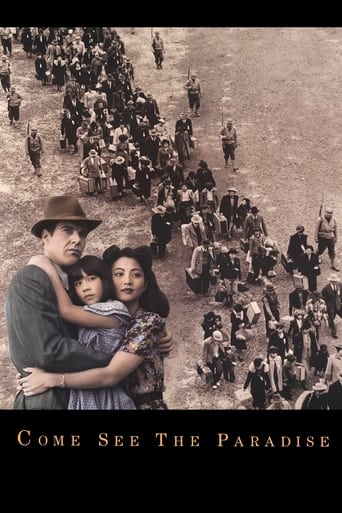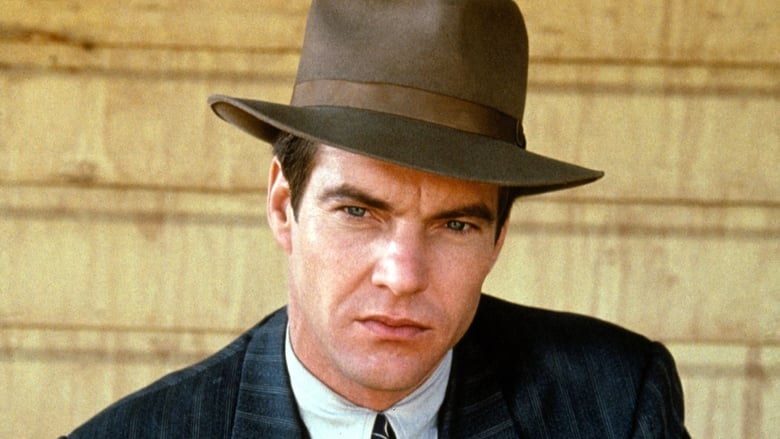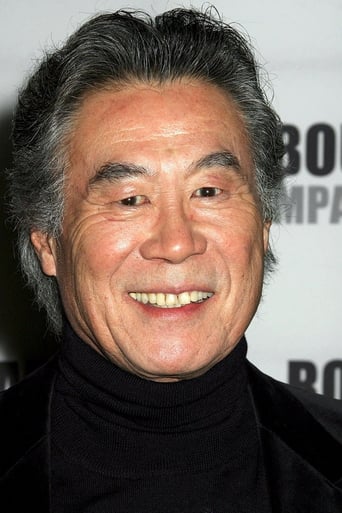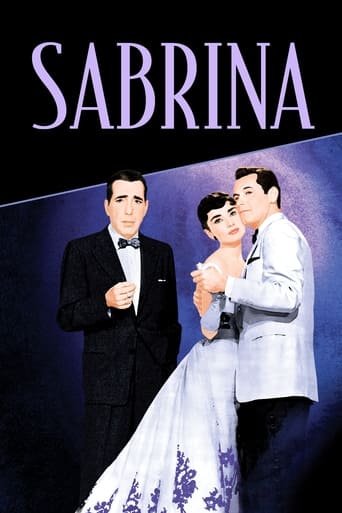Come See the Paradise (1990)
In this drama from director Alan Parker, on-the-lam Jack McGurn flees to Los Angeles and takes a job as a projectionist at a movie theater owned by a Japanese-American man. Jack falls for the owner's daughter, Lily, but they are forced to elope to Seattle when her father forbids the relationship. The couple marry and have a daughter, but when World War II breaks out, Jack is powerless to stop his new family's forced internment.
Watch Trailer
Cast


Similar titles
Reviews
While the main plot line focuses entirely too much on the love story between Jack and Lily, there are some parts of the film that make it worthwhile.There was some redeemable aspects of the film. The setting shown after the Japanese were put into the camps was particularly powerful. We were able to see the vandalism and racism targeted at them during the weeks before internment, as well as the ghost towns left behind when they were forced out.. Some of the stereotypical responses of people who are put in camps were displayed in this picture. The father, an older man with a great sense a purpose before internment, completely lost his way in the camp. In Santo Tomas, where Americans were interned in the Philippines, there were similar instances of important men crumbling under the camp setting. The mother, who was not allowed to become a citizen of the United States, was told she could not help make camouflage military nets, even though she just wanted to be doing something and was not working for pay like her daughters. Though boredom is not the worst thing a person interned could experience, it shows how restricted they were. She simply wanted something to do but was not allowed because she was Japanese. The son, Charlie, developed a deep connection to his ancestor's homeland of Japan though he had never even been there and spoke little Japanese. The targeting and persecution forced him to embrace and learn more about his heritage and ultimately return to Japan. And opposite him was the son, Harry, who joined the U.S Army and died in service. Harry, a rational man who tended to err on the side of caution, did what he thought was safest for him, though it turned out to be the cause of his death. The different outcomes of these characters shows the ways people can react to internment, even within the same family.
Come See the Paradise is a Hollywood dramatized historical film. It incorporates aspects of historical facts, but alters it greatly in order to make it more relatable to the average American. What does that mean in terms of the film? Well there must be a straight, white male lead because who can relate to Japanese Americans? This creates a noticeable flaw in the film as a whole. Dennis Quaid's character felt unnecessary, stereotypical, largely one-dimensional, and empowered by an overly noticeable sexual energy. Additionally, for a hefty film time of two hours and eighteen minutes, it felt as though only ~thirty of those minutes were spent inside the internment camp itself. It wasted so much time attempting to humanize these characters, and create backgrounds for them that it became confusing as to what type of movie we were watching. Although I appreciate the dedication for attempting to flesh out these characters more, most of this development could have been taken place within a camp setting. I did appreciate the depiction of portraying an interracial couple during a very racist time period. It was interesting to see how the Japanese family reacted to the situation, and seeing the expectation that Japanese women had in terms of their love life. It would be more important and realistic though to portray how society reacted to this couple. In 1940s California, people would not be accepting of a Japanese-American couple. This was a time where Japanese, or even other East Asian immigrants who appeared Japanese, were at times assaulted on the streets. The film touched on this with the racist Santa Claus, but this even had issues with it. Because of the film only depicted the racism through this one scene, it appears as though only a few Santas were racist, when in reality it would have been a majority of Santas! In reality, this couple would struggle to live their lives due to societal racism. They would be unable to eat at restaurants without complaint, see films, raise their daughter, etc. This was not depicted in the film. In fact, the film dedicated more time displaying how the Japanese family disapproved of the couple compared to society, that it made it seem that Japanese were more racist towards Americans, than Americans towards Japanese! This is an inaccurate depiction that severely hurt the films credibility.
While I applaud the writers, producers, and directors for their attempt to depict the Japanese-American experience during WWII, the execution was dire at best. The script was poorly written and poorly produced. In fact, I cannot decide which was worse the writing or the acting. The entire role of Dennis Quaid was annoying, and its only practical advantage was an awkward fumbling of a love story. I take it this narrative was intended to attract a larger audience. To be fair, American audiences are not historians per se, and likely want a dramatic love affair. The one redeeming quality of the film was the use of props and scenery. I suppose the budget allowed for an acceptable rendition of a west coast city in the 1940s. As for the historical accuracy, the film did convey generational tension and discussed the relevance of national identity during the war. Generational tension was depicted when Lily was pleading with her mother, after their long estrangement due to her marriage to Jack. She spoke in English, while her mother responded in Japanese. Another instance of generational tension was when Lily's brother refused to speak to his father, who her brother thought gave information to American intelligence. National identity was depicted by the discussion concerning the questionnaire that asked internees to pledge loyalty to the United States. Furthermore, the film showed the protests of the Japanese Citizen League within the camp. Overall the camp experience was portrayed accurately. Japanese-Americans endured forced migration to makeshift camps in the desert where they were held unconstitutionally.
Alan Parker's Come See The Paradise tackles a little spoken of, tragic period of American history: the internment of thousands of Japanese families in prison camps following the attack on Pearl Harbour, which sparked World War II. After the incident, a wave of frenzy and paranoia roiled across the states, and many of these people were separated from their loved ones for years, an event that altered thousands of lives, but not one you hear too much about in film. Parker is a born storyteller, whether it's historical lore or Gothic genre brilliance (insert obligatory Angel Heart reference), and here he approaches the subject matter with little to nothing in the way of melodrama, classic orchestral swells or tissue box bait, letting the story happen naturally and neutrally, the drama organically rising scene to scene as they happen. Dennis Quaid plays an Irish American man who falls in love with a Japanese girl (Tamlyn Tomita), and over a few years begins a life with her. He is a fiercely independent union man, passionately fighting for the working class, while she comes from a very tight knit family who rely on each other to make ends meet. Somehow the two of them make it work amidst the early stages of the American working machine, the love they have for each other keeping them afloat. Then the attacks occur. Quaid is separated from her and their daughter for over a decade, and the film's pacing makes you feel every lost, broken moment of it. When their reunion does happen, it's nothing like the romantic, tear jerking catharsis you'd expect, but a testament to Parker's commitment to realism. The sadness comes from the hollow, unceremonious way in which these people are affected by such things, and how they simply go on, adapt and adjust, the pain an intrinsic part of everyday life. The movies show a different picture of that usually, an idealistic bubble where things always somehow end up alright, and every last thread is tied off somehow. Not with this one, which is why it may have been forgotten. In any case, it's a beautifully tragic, eye opening piece that stays true to its narrative and follows it's characters throughout bittersweet, minimalistic and believable arcs.

















